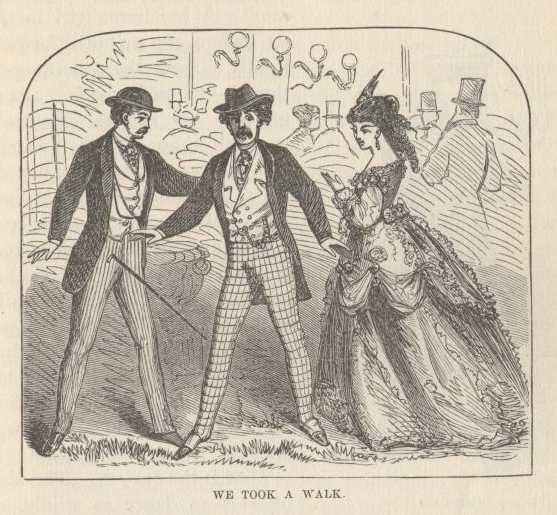One night we went to the celebrated Jardin Mabille, but only staid a little while. We wanted to see some of this kind of Paris life, however, and therefore the next night we went to a similar place of entertainment in a great garden in the suburb of Asnieres. We went to the railroad depot, toward evening, and Ferguson got tickets for a second-class carriage. Such a perfect jam of people I have not often seen—but there was no noise, no disorder, no rowdyism. Some of the women and young girls that entered the train we knew to be of the demi-monde, but others we were not at all sure about.
The girls and women in our carriage behaved themselves modestly and becomingly all the way out, except that they smoked. When we arrived at the garden in Asnieres, we paid a franc or two admission and entered a place which had flower beds in it, and grass plots, and long, curving rows of ornamental shrubbery, with here and there a secluded bower convenient for eating ice cream in. We moved along the sinuous gravel walks, with the great concourse of girls and young men, and suddenly a domed and filigreed white temple, starred over and over and over again with brilliant gas jets, burst upon us like a fallen sun. Nearby was a large, handsome house with its ample front illuminated in the same way, and above its roof floated the Star-Spangled Banner of America.
“Well!” I said. “How is this?” It nearly took my breath away.
Ferguson said an American—a New Yorker—kept the place, and was carrying on quite a stirring opposition to the Jardin Mabille.
Crowds composed of both sexes and nearly all ages were frisking about the garden or sitting in the open air in front of the flagstaff and the temple, drinking wine and coffee or smoking. The dancing had not begun yet. Ferguson said there was to be an exhibition. The famous Blondin was going to perform on a tightrope in another part of the garden. We went thither. Here the light was dim, and the masses of people were pretty closely packed together. And now I made a mistake which any donkey might make, but a sensible man never. I committed an error which I find myself repeating every day of my life. Standing right before a young lady, I said:
“Dan, just look at this girl, how beautiful she is!”
“I thank you more for the evident sincerity of the compliment, sir, than for the extraordinary publicity you have given to it!” This in good, pure English.
We took a walk, but my spirits were very, very sadly dampened. I did not feel right comfortable for some time afterward. Why will people be so stupid as to suppose themselves the only foreigners among a crowd of ten thousand persons?
But Blondin came out shortly. He appeared on a stretched cable, far away above the sea of tossing hats and handkerchiefs, and in the glare of the hundreds of rockets that whizzed heavenward by him he looked like a wee insect. He balanced his pole and walked the length of his rope—two or three hundred feet; he came back and got a man and carried him across; he returned to the center and danced a jig; next he performed some gymnastic and balancing feats too perilous to afford a pleasant spectacle; and he finished by fastening to his person a thousand Roman candles, Catherine wheels, serpents and rockets of all manner of brilliant colors, setting them on fire all at once and walking and waltzing across his rope again in a blinding blaze of glory that lit up the garden and the people’s faces like a great conflagration at midnight.
The dance had begun, and we adjourned to the temple. Within it was a drinking saloon, and all around it was a broad circular platform for the dancers. I backed up against the wall of the temple, and waited. Twenty sets formed, the music struck up, and then—I placed my hands before my face for very shame. But I looked through my fingers. They were dancing the renowned “Can-can.” A handsome girl in the set before me tripped forward lightly to meet the opposite gentleman, tripped back again, grasped her dresses vigorously on both sides with her hands, raised them pretty high, danced an extraordinary jig that had more activity and exposure about it than any jig I ever saw before, and then, drawing her clothes still higher, she advanced gaily to the center and launched a vicious kick full at her vis-a-vis that must infallibly have removed his nose if he had been seven feet high. It was a mercy he was only six.
That is the can-can. The idea of it is to dance as wildly, as noisily, as furiously as you can; expose yourself as much as possible if you are a woman; and kick as high as you can, no matter which sex you belong to. There is no word of exaggeration in this. Any of the staid, respectable, aged people who were there that night can testify to the truth of that statement. There were a good many such people present. I suppose French morality is not of that straight-laced description which is shocked at trifles.
I moved aside and took a general view of the can-can. Shouts, laughter, furious music, a bewildering chaos of darting and intermingling forms, stormy jerking and snatching of gay dresses, bobbing beads, flying arms, lightning flashes of white-stockinged calves and dainty slippers in the air, and then a grand final rush, riot, a terrific hubbub, and a wild stampede! Heavens! Nothing like it has been seen on earth since trembling Tam O’Shanter saw the devil and the witches at their orgies that stormy night in “Alloway’s auld haunted kirk.”
(Innocents Abroad)
Asnieres
scott
1 December 2021